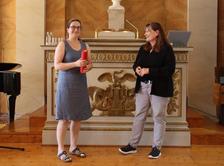Prof. Andrea Polle (right), Vice President of the Mathematical and Natural Sciences Class of the Göttingen Academy of Sciences and Humanities presented Melanie Schnell with the membership certificate. (Credit: Academy of Sciences, Adrienne Lochte)
Melanie Schnell, Lead Scientist at DESY and Professor of Physical Chemistry at Kiel University, has been appointed a full member of the Mathematical and Natural Sciences Class of the Göttingen Academy of Sciences and Humanities. She shares this honour with three other scientists from very different disciplines. Every one of them is regarded as a worldwide expert in their field. The ceremony to welcome the new members took place on 24 June 2022 in Göttingen.
Melanie Schnell is working to understand chemical processes at the molecular level with the objective to eventually control and manipulate these processes. To do this, she and her working group investigate complex molecular systems with the help of methods they have developed themselves. Schnell is not only concerned with biological questions, however, but also with astrochemical ones. "We want to understand which chemical processes take place in interstellar space and why. We can make excellent use of DESY's free-electron laser FLASH for this research," Schnell explains. "As a native of Lower Saxony, I am of course very proud to be appointed a member of the Academy of Sciences." Göttingen is located in Lower Saxony, a northwestern state of Germany.
Scientists who live in northern Germany are eligible to become full members at the Göttingen Academy of Sciences and Humanities. "The Göttingen Academy puts a lot of thought into the admission of new members, as it is not only the largest non-university institution in the field of basic research in the humanities in Lower Saxony, but also an academic society full of tradition," the Academy writes in its press release. "Only professors who have achieved exceptional things in their subject are elected." They are eligible to vote and have the right and duty to attend plenary sessions.
Every year, the Academy also elects numerous corresponding members to its circle, who usually live outside northern Germany, often abroad. Some 360 scientists around the world from very different disciplines are members of the Academy, including seven Nobel Prize winners.







